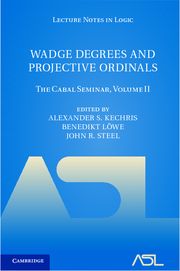Wadge Degrees and Projecive Ordinals – The Cabal Seminar, Volume II
Alexander S. Kechris, Benedikt Löwe. John R. Steel (Editors)
 Year: 2012
Year: 2012
ISBN: 9780521762038
548 pages. Hardcover.
Buy now (when ordering, include the discount code ASL2016 to receive the 25% ASL member discount)
The proceedings of the Los Angeles Caltech-UCLA ‘Cabal Seminar’ were originally published in the 1970s and 1980s. Wadge Degrees and Projective Ordinals is the second of a series of four books collecting the seminal papers from the original volumes together with extensive unpublished material, new papers on related topics and discussion of research developments since the publication of the original volumes. Focusing on the subjects of ‘Wadge Degrees and Pointclasses’ (Part III) and ‘Projective Ordinals’ (Part IV), each of the two sections is preceded by an introductory survey putting the papers into present context. These four volumes will be a necessary part of the book collection of every set theorist.
Table of Contents
Part III. Wadge Degrees and Pointclasses:
- Introduction to Part III Alessandro Andretta and Alain Louveau
- Wadge degrees and descriptive set theory Robert Van Wesep
- A note on Wadge degrees Alexander S. Kechris
- Some results in the Wadge hierarchy of Borel sets Alain Louveau
- The strength of Borel Wadge Determinacy Alain Louveau and Jean Saint-Raymond
- Closure properties of pointclasses John R. Steel
- The axiom of determinacy and the prewellordering property Alexander S. Kechris, Robert M. Solovay and John R. Steel
- Pointclasses and wellordered unions Steve Jackson and Donald A. Martin
- More closure properties of pointclasses Howard S. Becker
- More measures from AD John R. Steel
- The Borel degrees William W. Wadge
Part IV. Projective Ordinals:
- Introduction to Part IV Steve Jackson
- Homogeneous trees and projective scales Alexander S. Kechris
- AD and projective ordinals Alexander S. Kechris
- A Δ 1/3 coding of the subsets of ω ω Robert M. Solovay
- AD and projective ordinals Steve Jackson
- Projective sets and cardinal numbers: some questions related to the continuum problem Donald A. Martin
- Regular cardinals without the weak partition property Steve Jackson